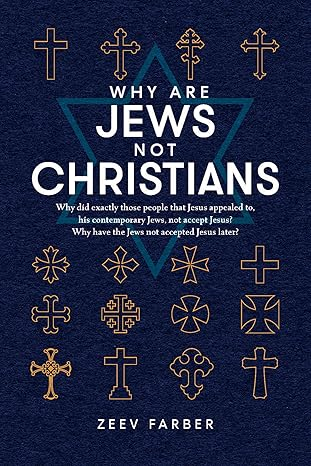WHY ARE JEWS NOT CHRISTIANS? by Zeev Farber
- booksrnb
- Sep 23, 2025
- 4 min read

Genre: Theology | Jewish Studies
Star Rating: ★★★★☆ (4/5)
Introduction The relations between Judaism and Christianity are not simply relations between two different religions. Christianity claims that it is the true heir to Judaism, the “New, True Israel” (“Verus Israel”), and sees itself not next to Judaism, but replacing it. The very continuing existence of Judaism is therefore perceived by Christians as a challenge to Christianity, as a refutation of its fundamentals. Christians have always been upset by the question of “Why do the Jewish people continue to exist, even though they should have disappeared?”.
The book offered to you proposes an answer to this two thousand-year-old question. The book not only discusses the difference between the interpretations by the biblical prophecies about the Messiah, but also that which is usually not discussed in publications on Judeo-Christian relations: the difference between the very concept of “Messiah” in Judaism and Christianity, and the doctrinal, basically incompatible differences between the two religions. The question raised in the book’s title is examined from all possible viewpoints. In contrast to other books on Christian-Judaism relationships, critical aspects are discussed in detail and are not smoothed over at all.
Review
I’ll be honest, when I first agreed to review this book, I had no idea what I was stepping into. The topic is definitely controversial, and with the Israel–Palestine issues unfolding everyday, the timing couldn’t be more intense.
For most of my life, I’ve stayed pretty removed from the whole Jewish conflict. I’ve read the occasional book, like The Diary of a Young Girl and The Choice, and seen a film or two, like Schindler’s List, but beyond that I’ve stayed pretty distant and honestly quite ignorant about the Jewish faith. It felt distant, just something I’d occasionally catch in the news from far away. But reading this book cracked that bubble for me. It challenged the comfort of my ignorance and gave me a fresh perspective I wouldn’t have reached on my own. For that, I’m actually grateful I got the chance to read it. If you follow my reviews or my posts on Instagram, you already know I don’t shy away from dense, heavy reads. In fact, the bigger the volume, the happier I am. This book offered happiness, all the while insisting on intellectual rigor - never making its consumption an easy comfort. Once I understood the seriousness with which I needed to read this book, I read it with such.
"WHY ARE JEWS NOT CHRISTIANS" distinguishes itself as an incisive and extensive exploration of the complicated relationships and persistent boundaries between Judaism and Christianity, as opposed to more cursory interpretations prevalent in the genre.
Written in an engaging, accessible prose, the work is as comfortable in academic settings as it is for lay readers interested in religious studies or interfaith dialogue. Its tone is measured, neither polemical nor apologetic - offering both historical clarity and empathetic understanding to those on both sides of the divide.
I’m not trying to stir anything up here because everyone’s entitled to their own beliefs, and religion is powered by faith, fear, and worship - there’s no bad intention in talking about it. But when I read this book, almost like a scientist stepping back (since I’m not part of either culture but respect both equally), I can appreciate the way it brings together research. It covers stuff like how the idea of Jesus might have formed, whether he was banished for our sins or executed by the Romans because he was called the 'king of the Jews' which was a big no-no without the emperor's permission, and thinking through all of that makes sense.
The way the book details how some texts borrow from Jewish writings is logical, too. Sure, some truths are constant- like Newton discovering gravity- and if someone else found the same thing later, it’s because some basics never change. Maybe that’s true for religion, too.
Could religious texts be as foundational as scientific discoveries?
Maybe religion was humanity’s first big step beyond mere survival, helping people think about themselves and each other, building virtues that benefit the whole community.
A major concern is each tradition's firm stance on messianic identity. The book explains why, despite shared history and scriptures, Jews remain skeptical of Christian claims about Jesus, and why Christianity's acceptance of Jesus as the divine Messiah marked a decisive barrier. It places these debates within bigger considerations about scripture, identity, and historical scars, such as persecution and exclusion, which resonate powerfully with Jewish readers.
The material is written in engaging, accessible prose that is appropriate for both academic settings and lay audiences interested in religious studies or interfaith discourse. Its tone is moderate, neither argumentative nor apologetic, providing historical clarity and empathic understanding to those on both sides of the divide.
WHY ARE JEWS NOT CHRISTIANS" distinguishes itself as an incisive and extensive exploration of the complicated relationships and persistent boundaries between Judaism and Christianity, as opposed to more cursory interpretations prevalent in the genre. While no New York Times review is available, a judgment in that style can contextualize its approach and appeal. This book is pretty dense, but I’d definitely recommend it to anyone who wants to challenge their thinking or has an interest in the broader study of religion.



Comments